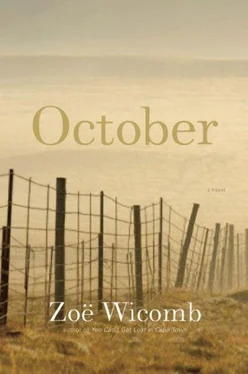Thank God, the boy shuts his eyes abruptly and turns over, draws up his knees as if to sleep. Now Sylvie will have to deal with Jake, who is stumbling about behind the door. Damn, damn, damn the devilish drink. She has never been read to as a child the terrifying tales of monsters and giants who chill the blood, but who get their comeuppance in the old end. Behind the door Jake grows vast and evil, a giant-devil capable of anything, so that she flinches. Perhaps it is she whom he will kill today.
Thank heavens she baked yesterday. Sylvie takes Jake a placatory cup of coffee and peanut-buttered bread as well as some panados, and gently pushes him down, back onto the bed.
Here, she says, you’ll feel better after more sleep.
You get that knife sharpened, Jake says quietly. Today, no later than today, I’ll kill him.
Sylvie laughs mirthlessly. He’s dead and buried, Jake. How many times do you want to kill him? He’s saved you the trouble, remember?
Would you like sausage and beans for supper? she asks, in the knowledge that the way to a man’s heart is through his stomach. She has made the sausage herself, and would stretch the dish with salted, wind-dried intestine. What Jake imagines they live on, Sylvie has no idea. Her part-time job at the butchery is poorly paid and Jake has been on sick pay for two weeks. What she does suspect is that he has been lost for good to the evil drink, that she will never have him back, and although she knows that there is nothing a girl can do to change the course of events, she should at least make an effort to challenge Lady Fortune. For all her social fears, Sylvie does not take things lying down. She has after all nursed him back once before, rescued him from death’s very door, and that only six years ago. But today he is impossibly evil.
You’ve crept out of a reed hut to ruin my life, Jake replies calmly, and reaches for his bottle. He coughs violently, then a horrible gurgling sound escapes from his throat.
See, she says, it’s not nice to drink from a bottle, not healthy, and points to an empty glass.
Jake picks up the glass, a tumbler, turns it this way and that, for all the world as if he were checking for any smudges, for evidence of her failing as a wife, before aiming it at the wall.
Ouch, Sylvie laugh-cries, holding her head, as if she’s been in the firing line. This is no way to behave. If only you could pull yourself together and stop this childishness, this badness. What an example for Nicky! I’m not used to such behavior. Also, I didn’t grow up in a reed hut, she adds, my AntieMa’s house has a good zinc roof.
So why don’t you fuck off to AntieMa. Or to Kiewiet Street. Fuck off and take the little bastard with you. Get out.
Sylvie sighs. She hopes the child has not heard. She may be a nobody, but she hasn’t bargained on raising a child on bad language. Sylvie knows that Kiewiet Street is shorthand for Meester, whose name Jake will not, cannot utter. But surely he has not forgotten that Meester is dead, that the house is now being sold?
At the kitchen sink, instead of doing the dishes, she stands clutching her right elbow in her left hand, staring fixedly ahead. Just her luck that Jake is not only a drunk, but is also losing his marbles.
It is in the small, dark hours that things get tough, and Mercia must find ways of stemming the phantasmagoria of grief. The conference paper is finished, needs to rest (like pastry, she advises her students, acquiring new properties in left-alone time) so that it becomes more legible for the final edit, and now she should perhaps try her hand at. . memoir. Oh, there is cause for pause. Mercia is skeptical of the genre, has misgivings about the contemporary turn to memoir, would not dream of reading such a thing. A cliché, of course, this kind of writing deemed suitable for a woman who has been left. Which means that she spends some time hunched over the screen, blank save for the word memoir at the top of the page, typed first in plain text, turned into bold, then into parodic italics.
Mercia’s youthful idea of herself as a poet, she thinks, has in fact been a false start at autobiography, and meeting Craig, a real poet, has mercifully put an end to that folly. Then there was much raking of fingernails across her scalp, much doodling in the margins, as you would, not knowing who you are. But now, in a forest of midnight loneness, in the crazed hours of grief, she grows bold. If she thinks of such writing as private, not for publication, then really she is free to write; there need be no thinking through the reason or purpose, no need to retract her views on memoir, and more importantly, no repetition of the angst-ridden biting of the pencil. There is after all a screen, ready to receive an image of herself, but also to protect, to conceal.
Mercia has no intention of wasting her research day on this project. The memoir will be strictly for midnight. And so her fingers fly across the keyboard; words flow effortlessly, for rather than start with the self, there are her parents, Nicholas and Antoinette, both dead and representable. How little, really, she remembers or knows about them; how much there is to invent. She saves the file as Home.
In the past friends have said wistfully — even Smithy — How far you have traveled. You should write your story.
Mercia has met this with embarrassed silence. They are mistaken, also about the source of her embarrassment. Yes, she has come a long way geographically, crossing a continent, but what people really are alluding to is what they believe to be a cultural gap, a self-improvement implied in the distance between then and now, the here of Europe seen as destination. In that sense, Mercia is not conscious of having traveled any great distance. As she once deigned to explain to Craig, her humble origins left little room for improvement. Besides, autobiography is what people like her are expected to produce, and thus for Mercia not a possibility.
Craig has been gone now for eighty-seven days and sixteen hours.

Nicholas Theophilus Murray was a good man, a decent colored man, with a name that he had never disgraced — unthinkable, he was a Murray, of civilized Scottish stock. He neither drank nor smoked. A good man need not rely on anything other than himself. Nie Klaas, he jested, cracking his name in two. No Klaas, so ever my own Baas, and he thumped his chest proudly.
I am Meester, he announced when he first arrived in Kliprand as a young teacher, and Meester was what everyone called him. Within weeks he became a deacon in the Sendingkerk with its new modern building in the center of the village. There he devised plays for young folk, Old Testament narratives turned into dramatic dialogues, with brimstone homilies for keeping the youth out of the bar and on their toes. His thoroughly up-to-date Moses would strike a papier-mâché rock and declaim the commandments, bringing tears to the eyes of old and young alike. But the truth was that even respectable, churchgoing people were all too fond of the devilish drink. Which saddened Nicholas, not least for the fact that the bar was a humiliating window at the back of the Drankwinkel, where they waited (how could they?) until every white customer had been served. Really, it was this abject behavior that made him think of the Namaqualanders as hotnos.
Not that Nicholas had any objection to a decent tot of whisky or brandy, or even a beer stout; he was not narrow-minded, and a drink on festive occasions, birthdays, New Year and so on — though not Christmas — was not a problem. For such rare occasions he favored brandy, something with a good name like Oude Meester. Wine, like the cheap Oom Tas or Lieberstein favored by the people, did not so much turn his stomach as turn his thoughts to dignity, a reminder to straighten his back and lift his chin. So that Jake the reprobate said that in spite of Grootbaas’s belief in his own rectitude, it showed that everyone slumps and slackens, and from time to time finds to his horror that his head is hanging. Like shitting, he added, everyone slumps, so that Mercia shut him out with palms pressed against her ears.
Читать дальше













